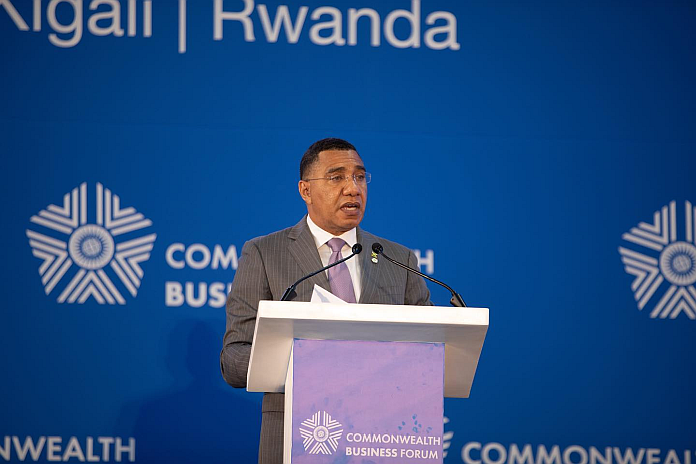By Latonya Linton
KINGSTON, Jamaica, (JIS) – Jamaica has accelerated the buildout of its national broadband initiative to facilitate the rollout of high-speed Internet access across the island. In addition, the Universal Service Fund (USF) has been providing free Wi-Fi Internet access points in major town centres, public green spaces and parks, and communities across the island.
Addressing the Commonwealth Business Forum heads of government and business leaders’ round table in Kigali, Rwanda, on June 22, prime minister, Andrew Holness, informed that Jamaica is actively developing the human resource capacity in information and communications technology (ICT).
“In collaboration with the private sector and international partners, we recently launched a coding academy and started the process of mainstreaming coding in the public school system. Despite this effort, the lack of technical skills remains prevalent and is an immediate constraint on our economic development,” he noted.
“This stands true in other Commonwealth countries, making the need to equip our population with the requisite digital skills an increasingly critical priority,” the prime minister added.
Holness said that within the Commonwealth, there are countries at various stages of digital development and maturity, including some that are at the cutting edge. He argued that one of the priorities of the Commonwealth must be to support and accelerate the digital development of all members, particularly in areas of governance and regulation.
“Each country within the Commonwealth must place significant emphasis on improving its telecommunications and ICT sectors, and design bolder plans to digitalise services and promote greater digital inclusion, in partnership with our private sector and innovators,” the prime minister suggested.
In addition, Holness said eliminating digital inequality must have at its core, gender equality, the goal of which is to maximise social inclusion by enhancing the participation of women and girls in all areas of development and supporting women’s entrepreneurship in digital business and work.
He noted that digital technologies also provide an attractive avenue for boys and young men who left the formal education system and have become embroiled in antisocial behaviour.
“We must push for STEM programmes in our schools that provide the necessary support for the next generation of designers, coders, and software developers. As part of the process of inclusion, keen attention must be paid to the needs and concerns of persons with disabilities in accessing and using digital technology,” Holness said.
Meanwhile, the prime minister noted that the way forward for middle-income Commonwealth states will require even greater investment in research and innovation to build digital capacity and to ensure that “we are empowered, enabled and, indeed, re-positioned to manage shocks and take advantage of opportunities”.
The Commonwealth is reported to be home to 12 percent of the world’s researchers and accounts for around 10 percent of global research and development expenditure.
“We, therefore, have within our grouping a critical threshold of resources to meaningfully support and accelerate the digital development of our members through improving our regulatory framework and supporting foundational systems, such as digital identity; expanding the capabilities and readiness of our human resources in ICT; inclusion of the vulnerable; and building resilient digital infrastructure and ICT capacity,” Holness said.
Prime minister Holness made his presentation under the theme ‘Bridging the Digital Divide’.





